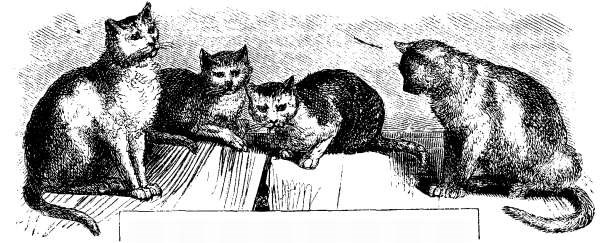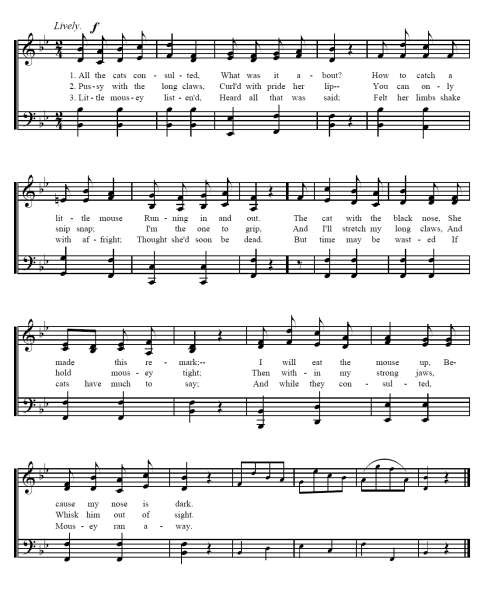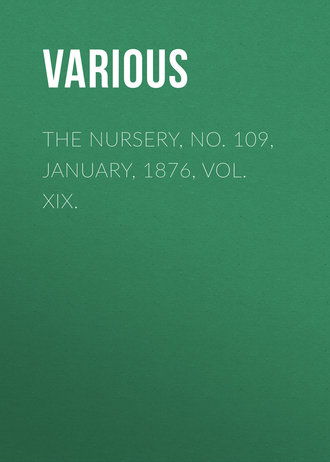 полная версия
полная версияThe Nursery, No. 109, January, 1876, Vol. XIX.
Sometimes we would play going through the woods, where the Indians were likely to waylay us. Then Milo was our pathfinder. With his nice sense of smell he must find out where the cunning redskins were lying in wait.
There was no end to the uses to which we put the dear little dog in our plays. Never did he snarl, or lose his temper. He saw that we loved him; and he repaid our love by taking all the pains he could to please us.
But a dark time came for Milo and for us. A fright about mad dogs broke out in our town. A bad fellow said he had seen another dog, who was known to be mad, bite Milo. This was untrue; for Milo was at home at the time.
But all our prayers were of no use. We must bring Milo to the town-hall to have him shot. How we children wept and took on! Poor Milo, our dear little playmate! Must we lose him forever? We could not bear the thought.
The little dog himself saw that something was the matter, and whined at seeing us all so sad. All at once up started our eldest brother, Robert, and declared it should not be. He would rescue the little dog.
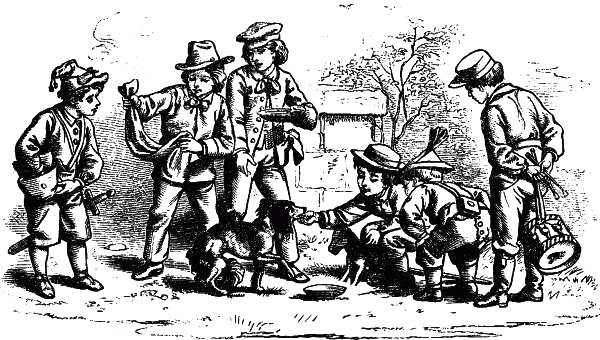
He did so without letting any one know of his plan. He took Milo, at night, in the cars, to the nearest great city. Here one of our cousins lived. Placing Milo in his charge, Robert came back; and when the town-officer came after the little dog, to kill him, he was told that Milo had stepped out, and, if the town-folks wanted him, they must find him.
In a few months, the outcry about mad dogs was hushed; and then we had Milo home again. What rejoicing there was! And how glad was Milo himself to get back, and greet all his little friends with barks and leaps!
From the German.THE THREE CALVES
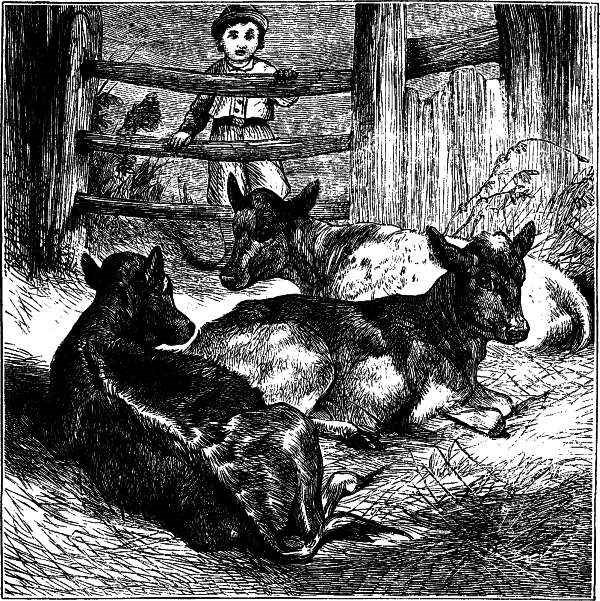
My little friend Max was on a farm, a whole week last May, and he likes to talk of the good time he had there.
He says there were no less than three calves in the great field; and he used to watch them and feed them two or three times a day.
They grew to be so tame that they would let him come up and pat them on the back, and feel of their budding horns. He gave them each a name.
One he called Daisy; one, Pink; and one, Rose. He said if he had been with them three weeks, he should have taught them to know their names.
He hopes to see them again next May; but I think they will be good sized cows by that time, for they grow very fast.
A. B. C."WHY?"
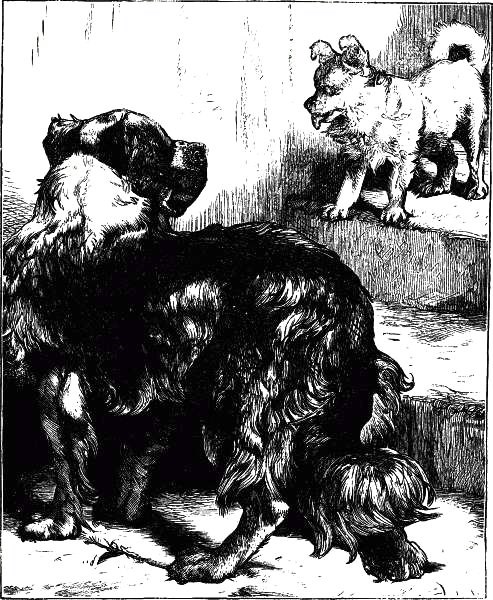
"You must not go in there!" said an old dog to a young pup who stood on the white steps of a large house. "You must stay out now."
"Why?" asked the young pup. For it was a trick (and a bad trick) of his to say, "Why?" when he was told to do, or not to do, a thing.
"Why?" said the old dog: "I cannot say why. Old as I am, I do not know why. But I do know, that, if you go in when it is a wet day like this, the maid will drive you out."
"But why?" went on the pup. "It is not fair. There is no sense in it. I have been in the house some days, and no one turned me out; so why should they now?"
"Those were fine, sunny days," said the old dog.
"Well, it is on the wet days that I most want to be in the house," said the pup. "And I don't see why I should stay out. So here I go."
And so he did; but he soon found, that, though no one stopped to tell him "why" he must not come in, it was quite true that he might not. The first who saw him was the cook, who had a broom in her hand.
"That vile pup!" cried she. "Look at his feet!"
"What is wrong with my feet?" barked the pup.
But she did not wait to tell him. She struck him with the broom; and he fled with a howl up the stairs.
"Oh, that pup!" cried the maid, as she saw the marks of his feet. "He ought not to come into the house at all, if he will not keep out on wet days."
"But why?" yelped the pup, as the maid threw a hearth-brush at his head.
Still no one told him why. But a man just then came up stairs. "Why, what a mess!" he said. "Oh, I see! It is that pup. I thought he knew he must not come in!"
"So I did; but I did not know why," growled the pup, as, with sore back and lame foot, he crept under a chair.
"Come out, come out!" cried the man. "I will not have you in the house at all. Out with you!" And he seized him with a strong hand, and chained him in a stall.
"You might have stopped out, and played on the grass, if you had staid there," the man said. "But, as you will come into the house when you ought not to, you must be kept where you cannot do so."
And so the young pup had to stay in the dull stall. And when, at last, he was let out, he did not ask, "Why?" if he was told to do, or not to do, a thing, but did as he ought at once, like a wise dog.
Author of "Dick and I."THE OLD YEAR AND THE NEW
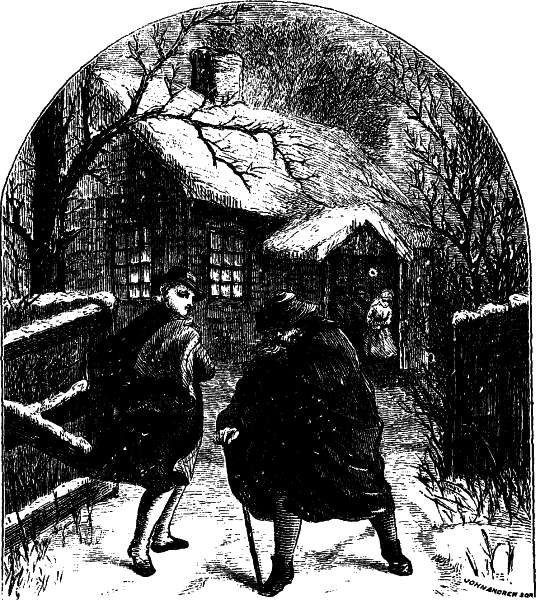
"Good-by, Old Year!" "Good by, good-by!" he replies, as he goes out into the cold and snow. "Be good children!" "Who comes? who comes?" "This is I, the glad New Year!" "What have you brought?" "A plenty of good wishes. Oh! you must all be good children!"
A MORNING CALL
Baby Nan has company,Baby Nell has come a-callingIn her carriage riding gay:Nan sits on a great soft shawlWith two pillows, lest she fall.Nan, here's little Nell come calling!Haven't you a word to say?"Gar goo, ghee! gar ghee, argoo!"Nell, she's saying, "How d'ye do?"Pillows bring for baby Nell;On the soft shawl seat her grandly,With her mouth set rose-bud way,And her grave blue eyes surveyingThis strange room she's so astray in.Nell, dear Nell, don't cry! see Nannie!Haven't you a word to say?"Ar-goo, dah, dah! dah dah, goo!""I am pretty well, are you?"Baby Nan has not a fear;Up and down her small fists flying,Bright eyes dancing, laughing gay!Nell, she's showing you her socks;Now she shakes her rattlebox;Hands and feet she keeps a-flying;She has something more to say:"Bab, bab, bab! kee-ee, bab, er!"I cannot interpret her.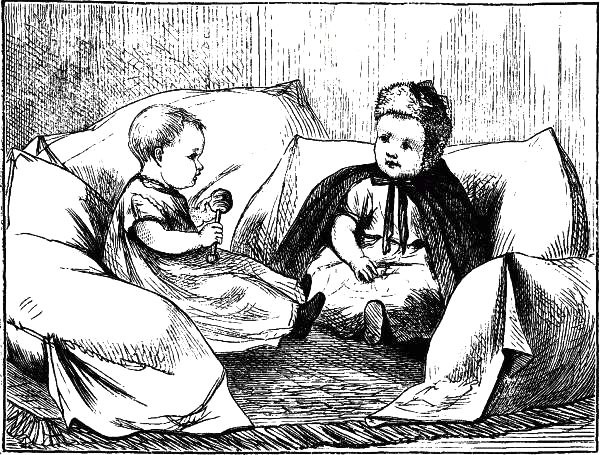
"HE DID IT FIRST."
There were once two sheep who lived in a field. One was black, and one was white. In the same field lived a horse and a cow. Now, the black sheep was not at all good. But, where he chose to go, the white sheep would go; and, what he did the white sheep would do.
So they both did what they ought not. And when the white sheep was asked why he did what he ought not, he would say, "The black sheep did it first!" One day, a boy went through the field, and did not shut the gate. The black sheep saw it, and ran out of the field with great glee. The white sheep saw it too, and they both went some way.
But soon they met a large dog, who knew that they ought not to be out in the road. He ran at them, and bit them, and tore some wool off their backs. They were glad to run back to the field; and the white sheep was quite ill with fright all the rest of the day.
"But why did you go?" said the old cow. "The black sheep went," said the white one. "He did it first."
Well, the gate was shut; but one day the black sheep found a way out of the field through a hole in the fence. He crept through the gap; and, of course, the white sheep crept through as well. They got out on the moor, and thought it fine fun to be there, with no one in sight.
Soon the black sheep, who was first, came to the edge of a deep pit. He gave a great jump, and leaped in.
The white sheep did not stop to think. He gave a great jump, and leaped in too. Down, down, down he fell, on to a heap of great sharp stones. Both he and the black sheep were much hurt. They could not get out, and were forced to lie there in great pain. By and by some men came by, and saw the sheep in the pit. The men got them out, and took them back to the field, and sent for some one to see what could be done for them.
The horse and the cow, in great grief, came and stood by the side of the white sheep as he lay on the grass. They were fond of him in spite of all his faults. "Oh, why!" cried the cow, with tears in her eyes (and the bell that was hung round her neck shook and rang as she leaned over him),—"why did you leave the field with the black sheep?"
"He did it first," said the white one in a faint voice.
"Then why did you jump down that steep place? Could you not see that it was a pit?"
"I did not stop to see. He did it first," said the white sheep. Then, with a groan, he went on to ask, "How is the black sheep? Is he here too? And what does the man think who comes to see us?"
"I grieve to say," said the cow, "that he thought you were both far too much hurt to live. The poor black sheep has just died, and I fear that you must die too."
"He did it first," said the white sheep. And with those words he died.
Author of "Dick and I."THE CATS AND THE MOUSE
